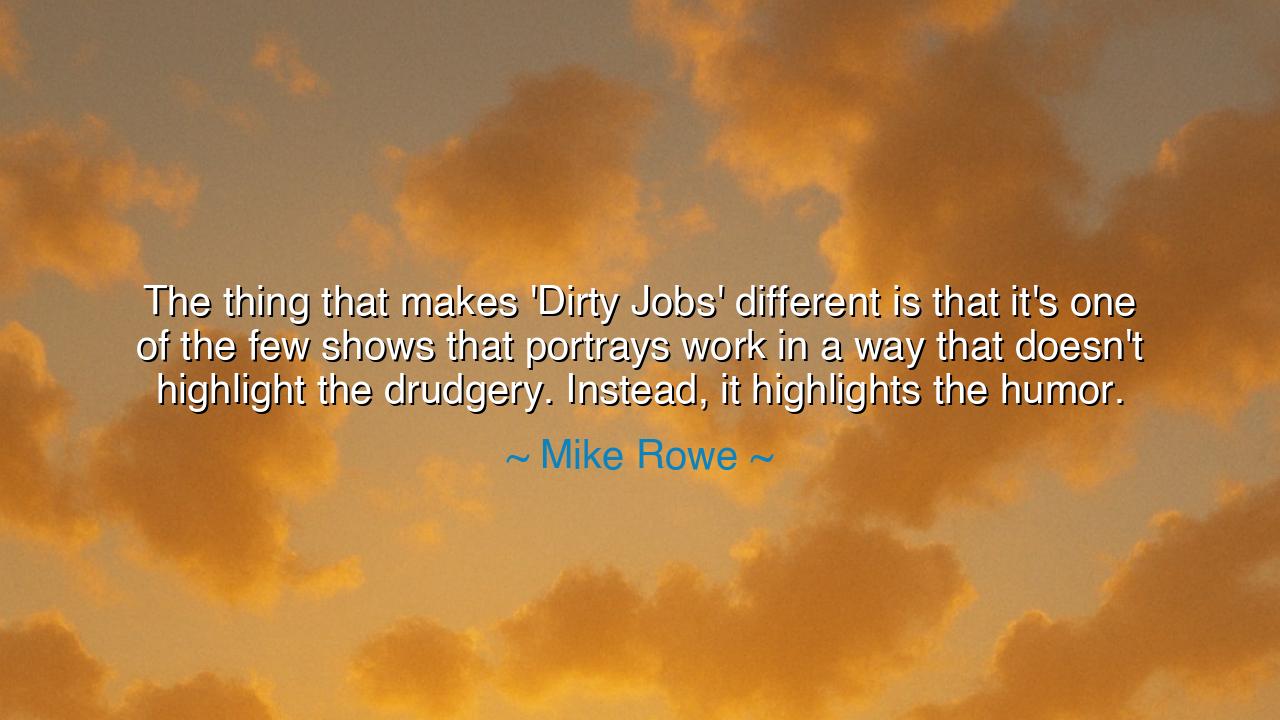
The thing that makes 'Dirty Jobs' different is that it's one of
The thing that makes 'Dirty Jobs' different is that it's one of the few shows that portrays work in a way that doesn't highlight the drudgery. Instead, it highlights the humor.






In the grand march of life, the nature of work has often been portrayed in stark, almost mournful terms, where labor is seen as a burden to be endured rather than embraced. Mike Rowe, in reflecting on the success of his show Dirty Jobs, speaks to a profound shift in perspective when he says, "The thing that makes 'Dirty Jobs' different is that it's one of the few shows that portrays work in a way that doesn't highlight the drudgery. Instead, it highlights the humor." These words carry a timeless truth—that work, no matter how grim, can be approached with a spirit of joy and humor, a force that has the power to transform even the most mundane and challenging tasks into something meaningful.
The ancients understood this wisdom well. In Homer's Odyssey, Odysseus and his men endure tremendous hardship—battling monsters, facing storms, and toiling through suffering—but even amidst the most perilous circumstances, humor and wit often provide a reprieve. Odysseus, famed for his cleverness and cunning, uses humor and resourcefulness to escape danger and find solidarity with his companions. It is not merely the hardship of their labor that shapes their journey, but their ability to face it with courage and a certain lightness of spirit. Similarly, Rowe’s show reflects this ancient understanding: work is not defined by its drudgery, but by the attitude we bring to it. The labor is difficult, yes, but the human spirit is not defeated, and it is through humor that the characters in Dirty Jobs find resilience.
The ancient Stoics, particularly Epictetus and Marcus Aurelius, taught that work—and all the hardships it entails—should not be seen as suffering, but as a path to virtue. Epictetus famously said, "Wealth consists not in having great possessions, but in having few wants." To the Stoics, the dignity of work was not in its results, but in the attitude with which it was approached. The ability to endure drudgery with a sense of humor was a mark of inner strength, of someone who could remain steadfast in the face of hardship. This is precisely the philosophy that Rowe conveys through Dirty Jobs: that no matter the difficulty of the task, the human spirit is free to find joy and meaning in the most unexpected of places. By highlighting the humor in even the most difficult jobs, Rowe reminds us that work is not a mere grind, but a celebration of human resilience.
Consider the example of the ancient Roman soldiers, whose lives were marked by ceaseless labor and hardship. Yet, even in the most brutal of circumstances, they were often able to find moments of humor. Plutarch writes of the soldiers’ camaraderie, how they would mock one another and laugh at the absurdities of war. Even in the midst of their grueling, dangerous lives, they found humor as a means of survival, an outlet that allowed them to bond and transcend the harshness of their conditions. Similarly, Rowe’s portrayal of dirty jobs does not dwell on the negative; it showcases how those who perform such work find joy in their labor, how humor provides a bridge that allows them to engage with the most unpleasant of tasks without being consumed by them.
Through the lens of Rowe’s words, we are invited to rethink the value of work itself. The lesson is simple yet profound: humor is not a luxury reserved for leisure, but an essential companion to labor. When we approach our daily tasks, no matter how arduous, with a spirit of laughter and joy, we transform them into something greater than a mere means to an end. We connect with the essence of life itself—finding meaning not in what we accomplish, but in how we experience the doing. This is the deeper understanding we find in the great wisdom of the ancients, from Socrates to the Stoics, who understood that the quality of our lives is determined not by the difficulty of our tasks, but by the attitude with which we approach them.
In the world today, too often we are swept up in the seriousness of our work, losing sight of the joy that can be found even in the most mundane activities. Rowe reminds us that humor is a necessary part of every job, a reminder that we are more than the sum of our tasks. The true value of work lies not in its rewards, but in the way we carry ourselves through it. By embracing humor, we can elevate our work, no matter how difficult, and find purpose in every task. Let us not shy away from the dirty jobs of life, but approach them with the humor and courage that transforms labor into a celebration of human strength.
So, let us take this lesson into our own lives. Whether we toil in fields, offices, or homes, let us recognize that work is not something to be endured, but something to be embraced. By bringing humor into our daily tasks, we connect with the deeper joys of life and remind ourselves that no matter how hard the work may seem, we always have the power to choose the spirit with which we engage it. Let humor be the light that guides us through the toughest challenges, the thread that connects us all as we face the world’s endless labor. In this, we find not just survival, but meaning and joy in every step of the journey.






AAdministratorAdministrator
Welcome, honored guests. Please leave a comment, we will respond soon